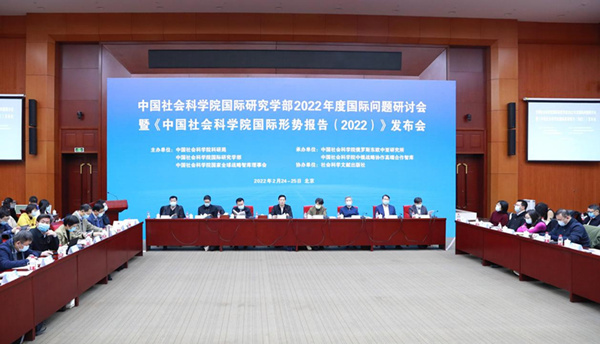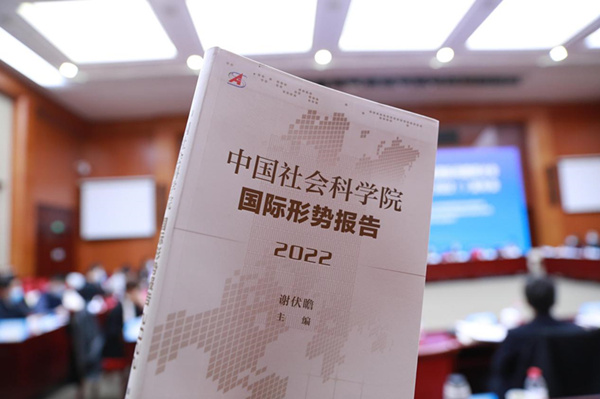
The release conference of the CASS Report on International Situation (2022) was held alongside a symposium on international issues for 2022 on Feb. 24 in Beijing. Photo: Zhu Gaolei (CSSN)

The CASS Report on International Situation (2022) Photo: Zhu Gaolei (CSSN)
The Chinese Academy of Social Sciences (CASS) released a report on the international situation, which summarizes global developments in 2021 and forecasts trends in 2022, on Feb. 24 in Beijing.
The release conference was held alongside a symposium on international issues for 2022. The event was sponsored by the Bureau of Scientific Research Management, the Academic Division of International Studies, and the National Institute for Global Strategy, and organized by Institute of Russian, Eastern European, and Central Asian Studies and the High-end Think Tank of China-Russia Strategic Cooperation in collaboration with the Social Sciences Academic Press, all subordinate to CASS.
In the keynote speech, Xie Fuzhan, president of CASS and secretary of the leading Party members’ group at CASS, discussed many unstable and uncertain factors which made the international situation increasingly complicated and tough in 2021. These factors include: mounting pressure of economic downturn despite a robust world recovery; ever more sophisticated strategic interactions between major countries, with competition and cooperation relationships deepening; an increasingly severe international security situation with escalating traditional security risks; and daunting challenges in eliminating global governance deficits, which made progress nonetheless.
The CASS Report on International Situation (2022) was compiled under Xie’s chief editorship, by researchers from institutes under the Academic Division of International Studies. The book offers a comprehensive analysis of the economic, political, social and diplomatic situations, as well as major events and risks in major countries and regions, as of 2021. On this basis, predictions of the global pattern’s development trends are made for 2022. At the release conference, representatives and authors from the Academic Division introduced the general report and sub-reports.
Zhang Yuyan, deputy director of the Academic Division and director of the Institute of World Economics and Politics at CASS, listed short-term factors influencing global economic development in 2021, including the ongoing COVID-19 pandemic, monetary and fiscal policies of major developed economies, drastic fluctuations in asset prices, and geopolitical turbulence. Meanwhile, mid- and long-term variables were discussed as well, such as financial supervision loopholes, population aging, technological advances, global governance, and strategic interactions between major countries.
Based on the above factors, Zhang said the world economy is forecasted to remain on the medium-low growth track and the growth rate is estimated to roughly fall within a range between 3% and 3.5% in the next three to five years, but growth will vary significantly across countries and regions.
Sun Zhuangzhi, director of the Institute of Russian, Eastern European and Central Asian Studies, shed light on the situation in Russia and Eurasia in 2021. Noting general political and social stability yet complicated security scenarios in the region, Sun said that related economies shared challenges in restructuring and growth. In his opinion, Russia and Eurasian countries’ internal affairs will enter a transitional stage in 2022 while social stability will meet greater political challenges.
The European economy recovered in 2021, but the growth was rather weak, and differed vastly among different countries on the continent. Tian Dewen, deputy director of the Institute of European Studies at CASS, noted that European economic recovery still faces risks in 2022, adding that Europe is the largest victim of the conflict between Russia and Ukraine. The Ukrainian crisis will cast a shadow over Europe in the future, Tian said.
“In 2021, China-Africa ties showed a good momentum, as the comprehensive strategic partnership further deepened,” said Li Xinfeng, director of the Institute of West Asian and African Studies and executive president of the China-Africa Institute under CASS. In 2022, the COVID-19 pandemic’s impact on the African economy and people’s livelihoods will extend to political and security spheres more speedily, and force African nations to accelerate economic transformation. However, subject to factors such as finance and security, African economic recovery prospects are not bright, Li said. Increasing anti-epidemic aid to Africa and intensifying economic cooperation will be the two themes for relationships between Africa and major global actors.
Compared with the steep economic recession in 2020, Latin America exhibited high “compensatory” growth in 2021. Chai Yu, director of the Institute of Latin American Studies at CASS, warned that this growth is fragile and lacks sustainable momentum. Also, it is highly alarming to see rising nationalism, particularly over resources, in Latin America since the COVID-19 outbreak, Chai said.
In Asia-Pacific, under continuous impact of the COVID-19 pandemic, economic growth rates of countries in the region were differentiated and even divided in 2021. Disruption risks loom large in regional supply chains, and digital technology is becoming a new force driving the reconstruction of Asian-Pacific value chains, said Li Xiangyang, director of the National Institute of International Strategy at CASS. Although some Western countries are urging for the reduction of China’s presence in the reconstruction of global value chains, huge domestic consumer needs within China will attract increasing international capital. The Chinese market is still likely to become the “haven” of global capital, he said.
Add: #5 Jianguomennei Street, Beijing, 100732,P.R.China
Copyright by CASS. All Rights Reserved

